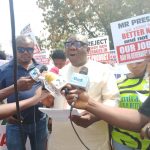IBBUL Must Not Fall: A Rejoinder to Alarmist Perspectives and a Call for Balanced Reform
A Rejoinder to “IBBUL May Collapse Academically” – A Call for Balanced Critique, Communal Responsibility, and Institutional Strengthening
By
Dr. Otunba Aiyeku Olufemi Samuel, BSc, MSc, MBA, PhD
Development Strategist | Governance Consultant | Higher Education Advocate
”When a man sees smoke and screams fire without looking for a bucket of water, his panic helps no one.”
– African Proverb Reimagined
The recent article by Dr. Musa Ismail Kontagora, PhD, titled “IBBUL May Collapse Academically”, is no doubt an impassioned cry from a concerned friend of the Ibrahim Badamasi Babangida University, Lapai (IBBUL). While his intention may be noble and some of his solutions commendable, his submission is deeply flawed in tone, method, and analytical balance. We must dissect the issues he raised with objectivity and chart a more constructive way forward—especially in times when stability and measured leadership are vital for the survival and progress of our educational institutions.
On Emotional Alarmism Versus Constructive Advocacy
Dr. Musa’s piece is heavily laced with alarmist overtones, projecting doom rather than galvanizing hope. “IBBUL May Collapse Academically” is a weighty declaration. But let us ask — What evidence supports this claim beyond anecdotal frustration?
Has the National Universities Commission (NUC) flagged IBBUL for academic decline? Have enrollment numbers fallen drastically beyond recovery? Have academic staff fled in alarming numbers?
While acknowledging the pain points of insecurity, transportation difficulties, and communal tensions, collapsing a university in theory or ink does nothing to solve its real problems.
Transportation Woes and Communal Exploitation – A Need for Policy Dialogue, Not Condemnation
Yes, the transportation cost from Lapai to Minna is a concern, especially in light of the economic hardship. However, blaming this entirely on “indigenous exploitation” is a gross generalization that could fuel ethnic resentment. Fuel prices have skyrocketed—transportation costs are up across Nigeria.
Is it the people of Lapai alone increasing fares, or is this a symptom of a national economic situation?
Instead of painting Lapai residents as exploiters, let us advocate for regulated campus-community transport schemes in partnership with unions and state authorities. Institutions like FUT Minna and UniAbuja have solved this through staff-student cooperative transport systems. Let IBBUL innovate.
Insecurity and Host Community Conflict – The Role of Collaboration
Dr. Musa raises genuine concerns on growing insecurity, but his commentary unfortunately vilifies the entire Lapai youth population without clear data.
Yes, there have been reported incidents of robbery and harassment, and these must be investigated, addressed, and prevented. But to allege that the host community as a whole is complicit is irresponsible.
Does insecurity in Maiduguri make all Borno residents terrorists? Or does crime in Lagos mean every indigene is a threat?
Security is a national challenge. Lapai must own its role but should not be stigmatized. Instead, we commend the Vice Chancellor, Professor Abu Kasim Adamu, and the Niger State Government for swiftly engaging security agencies, launching surveillance, and tightening the university’s security structure since the recent incidents. This proactive response deserves recognition, not silence.
The Spirit of Late Governor Kure – Misused or Misunderstood?
The founding vision of Late Governor Abdulkadir Kure was to bring education to the people and development to Lapai. To suggest his spirit will haunt the people is not just dramatic—it is disrespectful to his legacy. Development is a two-way street: the host community must welcome growth, but stakeholders must also educate, empower, and support the community.
Dr. Musa’s write-up missed a key angle: what has been done over the years to integrate and educate the Lapai youth on university-community relations? Are there outreach programs? Peace clubs? Collaborative safety initiatives?
We must build—not bash.
IBBUL’s Institutional Resilience – Facts Speak Louder
Despite the crisis, IBBUL has continued its academic calendar without major disruption. Students are writing exams. Research is ongoing. Admissions are open. Collaborative MoUs are being signed.
* In the last NUC rating (2023), IBBUL ranked among the top 40 state universities in Nigeria.
* Over 1,000 postgraduate students are enrolled, and over 30,000 undergraduates have passed through its gates.
* The university houses faculties of Agriculture, Natural Sciences, Management, Education, and Arts — none of which are under threat of collapse.
These are not signs of a dying institution.
Critical Look at “Solutions” Offered – Misguided or Misplaced?
While Dr. Musa’s concern is appreciated, suggesting that IBBUL be merged or converted into a faculty under AKUM University is not only premature—it is baseless. You don’t amputate a limb to treat a bruise.
Should we throw away a car with engine troubles instead of repairing the parts?
No. Instead, let us propose true solutions:
* State-subsidized campus-community transport schemes
* Security stakeholder summits with traditional leaders, police, and students
* Community engagement programs and sensitization campaigns
* Empowerment programs for local youth to prevent crime
* Real-time complaint systems for students and staff
* Monthly joint VC–community feedback meetings
Commendable Steps Already Taken – Let’s Build on Progress
The Vice Chancellor, Professor Abu Kasim Adamu, has shown leadership. Within days of the incident:
* A crisis management committee was inaugurated
* Security patrols were doubled
* Staff and student unions were engaged
* The State Government responded with additional logistics and assurance of long-term security reform
These efforts deserve applause, not omission.
Final Thoughts: The Role of All Stakeholders
Let us not pit students against communities. Let us not write off institutions built with sweat and hope. IBBUL is not collapsing—it is at a crossroads. And we must choose dialogue over division.
If you want to go fast, go alone. If you want to go far, go together. – African Proverb
Way Forward:
* Strengthen town-gown relationships through mutual engagement and benefit
* Develop localized economic alternatives to reduce dependence on student spending
* Install grievance redress platforms for staff and students
* Hold leadership accountable, but offer constructive pathways forward
In Conclusion
Rather than speak of collapse, let us speak of rebuilding, reforming, and restoring trust. IBBUL is a legacy project. Let us not light a match over its roofs while calling for repairs.
We must all rise above sentiments to save what still stands.
Dr. Otunba Aiyeku Olufemi Samuel, BSc, MSc, MBA, PhD
Development Advocate | Higher Education Strategist
0802 545 1262, 0803 786 6085 | aiyekuolufemi@gmail.com












